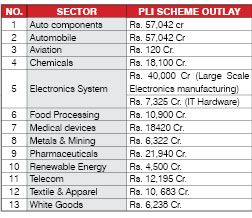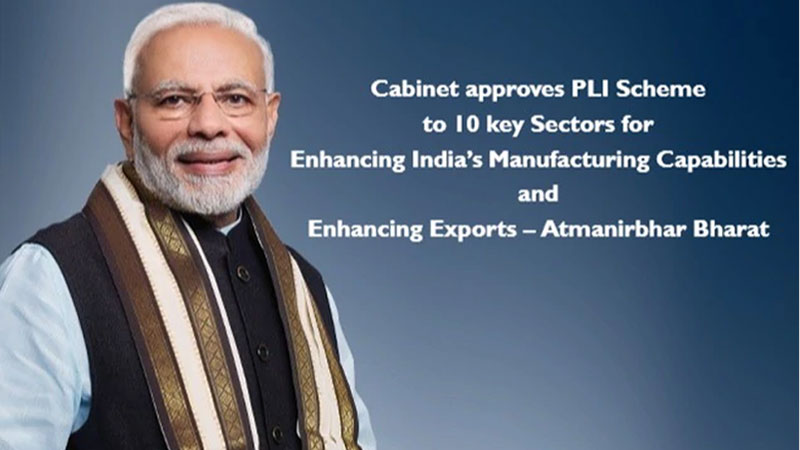Presenting the budget (FY 2021-22) in Parliament, Union Finance Minister Smt. Nirmala Sitharaman emphasized on need to double digit growth in manufacturing sector. She said, “Manufacturing companies need to become an integral part of global supply chains, possess core competence and state-of-the-art technology.” To accomplish the goal, Production Linked Incentive scheme(PLI) was launched across 13 sectors. About Rs. 1.97 lakh crore was provisioned for PLI in FY 2021-22 budgets. Under the scheme direct incentive is provided by the government on incremental sales. The incentive will be given to those domestic manufacturing units which manage additional sales for a period of five years subsequent to the base year. PLI will be also provided on incremental investment. Substantial goal of the scheme is to boost domestic manufacturing and enhancing export capacity and to attract foreign investment in manufacturing. The initiative will be also able to improve balance of payment by quantifying export and reducing import. This initiative is inspired by government’s Atmanirbhar Bharat Abhiyan(Self-reliant Campaign).

Earlier in March 2020, PLI had been announced in three sectors- Drug Intermediates (DIs) and Active Pharmaceutical Ingredients (APIs), Large Scale Electronics Manufacturing and Manufacturing of Medical Devices. Additional 10 sectors which include Electronic/Technology Products, Telecom & Networking Products, Food Products, White Goods, High-Efficiency Solar PV Modules, Automobiles & Auto Components, Advance Chemistry Cell (ACC) Battery, Textile Products and Specialty Steel are announced in the Budget of this year.
Taking forward the scheme, Modi Government on 15th September, 2021 approved a PLI scheme with an outlay of Rs 26,058 crore for the automobile and drone sector to boost electric vehicle and hydrogen fuel-cell vehicle manufacturing in the country. PLI Scheme for Automobile Industry and Drone Industry is part of the overall announcement of PLI Schemes for 13 sectors made in the Union Budget 2021-22.
The PLI scheme for the auto sector will incentivize high value advanced automotive technology vehicles and products and will create jobs. This scheme will be helpful in creating additional 7.5 lakhs job, further this will increase India’s share in global automotive trade. This scheme for auto and auto components businesses will benefit micro, small, and medium enterprises (MSMEs).
Earlier last year, the Union Cabinet had approved PLI scheme with an outlay of Rs 57,043 crore for auto manufacturing industry. The PLI scheme was later modified to focus on advanced automotive technologies. The newly-announced PLI scheme will be effective from FY23 for five years and the base year for eligibility criteria would be 2019-20. Both the existing automotive companies and the new investors will be eligible to take the benefit of this scheme.
The PLI scheme across these sectors will make Indian manufacturers globally competitive, attract investment in the areas of core competency and cutting-edge technology; ensure efficiencies; create economies of scale; enhance exports and make India an integral part of the global supply chain.
ACC battery manufacturing represents one of the largest economic opportunities of the twenty-first century for several global growth sectors, such as consumer electronics, electric vehicles, and renewable energy. The PLI scheme for ACC battery will incentivize large domestic and international players in establishing a competitive ACC battery set-up in the country. The automotive industry is a major economic contributor in India. The PLI scheme will make the Indian automotive Industry more competitive and will enhance globalization of the Indian automotive sector.
According to government’s data, the Indian pharmaceutical industry is the third largest in the world by volume and 14th largest in terms of value. It contributes 3.5% of the total drugs and medicines exported globally. India possesses the complete ecosystem for development and manufacturing of pharmaceuticals and a robust ecosystem of allied industries. The PLI scheme will incentivize the global and domestic players to engage in high value production.
Telecom equipment forms a critical and strategic element of building a secured telecom infrastructure and India aspires to become a major original equipment manufacturer of telecom and networking products. The PLI scheme is expected to attract large investments from global players and help domestic companies seize the emerging opportunities and become big players in the export market.
The Indian textile industry has a share of ~5% of global exports in textiles and apparel. But India’s share in the manmade fibre (MMF) segment is low in contrast to the global consumption pattern. The PLI scheme will attract large investment in the sector to further boost domestic manufacturing, especially in the MMF segment and technical textiles. The growth of the processed food industry leads to better price for farmers and reduces high levels of wastage.
India in last one financial year brought down import of solar PV panels to 571 million dollar by encouraging domestic manufacturers. Apart from protective tariff measures, focused PLI scheme for solar PV modules will incentivize domestic and global players to build large-scale solar PV capacity in India and help India leapfrog in capturing the global value chains for solar PV manufacturing.
White goods (air conditioners and LEDs) have very high potential of domestic value addition and making these products globally competitive. A PLI scheme for the sector will lead to more domestic manufacturing, generation of jobs and increased exports.
Several companies like Daikin, Panasonic, Hitachi, Mettube, Nidec, Voltas, Bluestar, Havells, Amber, EPack, TVS-Lucas, Dixon, R K Lighting, Uniglobus, RadhikaOpto, Syska among others have applied for manufacturing critical components of Air conditioners and LED Lights.
“PLI scheme aims at boosting domestic manufacturing and exports, is expected to increase country’s production by $520 billion in the next five years”
-Narendra Modi
A total of 52 companies have filed their application with committed investment of Rs 5,866 crore under the PLI scheme to incentivize the domestic manufacturing of components of White Goods (Air conditioners and LED lights), applications for which closed on 15 September, 2021. The PLI Scheme on White goods was notified on 16 April, 2021. 21 firms will invest Rs. 871 crore for LED components. 31 firms have committed about Rs. 4,995 crore for AC component manufacturing. India’s annual market for ACs is more than 7 million , but irony is that out of which 6 million are assembled with just 25% domestic value addition.PLI scheme has potential to reverse the ratio of value addition with manifold production capacity’
India is the world’s second largest steel producer in the world. According to data shared by the Ministry of Steel, India exported 10.7 million tonnes of finished steel during 2020-21. India exports steel to more than 170 countries. It has the potential to become a champion in certain grades of steel. A PLI scheme in Specialty Steel will help in enhancing manufacturing capabilities for value added steel leading to increase in total exports.
After the launch of the scheme, foreign companies like Toyota-Tsusho and Sumida are also planning to shift their manufacturing units to India. According to a report, around 1,000 companies have engaged in discussions with the Indian officials at various levels for shifting its manufacturing base in India. About 300 companies belonging to sectors like mobiles, electronics, medical devices, textiles and synthetic fabric are actively pursuing production plans.
The PLI scheme has created catalyst effect for Indian Economy by attracting foreign firms and lending agencies. PLI scheme shall create strong assets in long run and will strengthen the foundations of the Indian economy by 2024.


